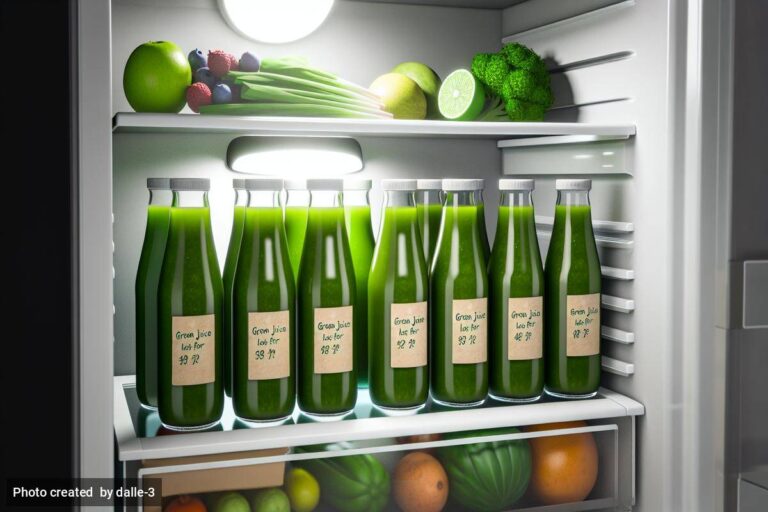Is Watermelon Juice Acidic?
[su_note note_color=”#fb8e00″ text_color=”#000000″ radius=”12″]
Watermelon juice isn’t just a refreshing drink on a hot summer day. It’s a beverage that many people are curious about, particularly In regard to its acidity level.
People want to know if watermelon juice is acidic and if it can lead to acid reflux or other digestive problems. Additionally, they may be interested in learning about the pH level of watermelon juice and whether it offers any potential health benefits or has any side effects. In this article, we will delve into these questions and provide you with all the information you need to know about the acidity of watermelon juice.
[su_box title=”
[/su_box]

Watermelon juice is known for its refreshing taste and various health benefits. To fully understand its impact on our health, it’s important to consider the pH levels of watermelon juice. pH measures the acidity or alkalinity of a substance, ranging from 0 to 14, with 7 being neutral.
1. The acidity of watermelon juice
Despite its sweet and juicy flavor, watermelon juice is slightly acidic. Typically, its pH level ranges from 4.5 to 5.5, making it mildly acidic. This acidity is due to the presence of citrulline and malic acid, which give watermelon its tart taste.
Conversely, it’s essential to note that the acidity of watermelon juice is relatively mild compared to other acidic beverages like orange juice or lemonade. This makes it generally safe for consumption, even for individuals prone to acid reflux or other digestive issues.
2. pH levels of watermelon juice
The pH level of watermelon juice can vary depending on factors such as the ripeness of the fruit and the juicing process. Ripe watermelons generally have a lower pH level compared to unripe ones. Additionally, adding other ingredients like lemon or lime juice can further lower the pH.
It’s important to emphasize that the acidity of watermelon juice is not a cause for concern for most individuals. In fact, the mild acidity of watermelon juice can have some health benefits. For example, the citrulline in watermelon juice has antioxidant properties and may help support heart health.
[su_highlight background=”#f6b40f”]Expert Tips: Watermelon juice’s mild acidity makes it safe for consumption. Ripe watermelons and added citrus lower pH levels. Enjoy its refreshing taste and potential heart health benefits.[/su_highlight]
Can watermelon juice cause acid reflux?
Many people wonder if drinking watermelon juice can cause acid reflux or other digestive problems. To address this concern, it is important to understand what causes acid reflux and how watermelon juice may affect it.
1. Factors that contribute to acid reflux
Acid reflux occurs when the lower esophageal sphincter (LES), a muscle that acts as a valve between the stomach and the esophagus, becomes weak or relaxes inappropriately. This allows stomach acid to flow back into the esophagus, causing symptoms such as heartburn, regurgitation, and chest discomfort. Several factors can contribute to the development of acid reflux, including:
- Diet: Consuming acidic or spicy foods, caffeine, alcohol, and carbonated beverages can trigger or worsen acid reflux symptoms.
- Obesity: Excess weight puts pressure on the abdomen, weakening the LES and increasing the risk of acid reflux.
- Smoking: Smoking weakens the LES and impairs esophageal function, making acid reflux more likely.
- Pregnancy: Hormonal changes during pregnancy can relax the LES, increasing the likelihood of acid reflux.
2. Effects of watermelon juice on acid reflux
Watermelon juice is considered to be relatively low in acid. Its pH level ranges between 6.5 and 7.5, which is considered neutral to slightly alkaline. This means that for most individuals, watermelon juice is unlikely to trigger or worsen acid reflux symptoms.
In addition, watermelon juice has a high water content, which can help dilute stomach acid and aid in digestion. It also contains beneficial compounds such as citrulline and lycopene, which may have health benefits.
Nonetheless, it is important to note that individual tolerance may vary. Some people may still experience acid reflux symptoms after drinking watermelon juice, especially if they have pre-existing conditions or are sensitive to certain foods. If you have a history of acid reflux or digestive issues, it is advisable to consult a healthcare professional before adding watermelon juice to your diet.
| Key Points |
|---|
| Watermelon juice is relatively low in acid, with a pH level ranging between 6.5 and 7.5. |
| Watermelon juice has a high water content, which can help dilute stomach acid and aid in digestion. |
| Individual tolerance may vary, and some people may still experience acid reflux symptoms after drinking watermelon juice. |
| If you have a history of acid reflux or digestive issues, it is advisable to consult a healthcare professional before adding watermelon juice to your diet. |
Digestive Benefits of Watermelon Juice
1. Hydrating Properties
Watermelon juice is highly hydrating, with over 90% water content. Consuming watermelon juice helps replenish fluids in the body, preventing dehydration and supporting a healthy digestive system.
2. Fiber Content
Watermelon juice contains a moderate amount of dietary fiber, which promotes healthy digestion. Fiber adds bulk to the stool, preventing constipation and facilitating regular bowel movements. It can also regulate blood sugar levels and promote feelings of fullness, aiding in weight management.
When consumed in moderation, watermelon juice is a refreshing and hydrating option that supports digestive health. Notwithstanding, some individuals may experience bloating or gas due to the natural sugars present in the juice.
2.1. Potential Health Benefits
Aside from its hydrating and digestive benefits, watermelon juice offers various potential health benefits. It is rich in vitamins A and C, which are antioxidants that boost the immune system and protect against cellular damage. The juice also contains lycopene, a powerful antioxidant that may reduce the risk of certain types of cancer.
2.2. Side Effects
At the same time generally safe for consumption, there are a few considerations to keep in mind when consuming watermelon juice. Excessive intake of the juice may raise blood sugar levels in individuals with diabetes due to its natural sugar content. Some people may also be allergic to watermelon or experience digestive discomfort when consuming large quantities.
If you have specific dietary concerns or medical conditions, it is advisable to consult with a healthcare professional or registered dietitian.
| Digestive Effects | Hydrating Properties | Fiber Content |
|---|---|---|
| Supports healthy digestion | Keeps the body hydrated | Aids in regular bowel movements |
| Potential health benefits | Rich in vitamins A and C | Contains antioxidants and lycopene |
| Side effects | May affect blood sugar levels | Possible allergies or digestive discomfort |

Health Benefits of Watermelon Juice
Watermelon juice is not only refreshing and delicious, but it also offers numerous health benefits. Packed with essential vitamins and minerals, this fruit juice can contribute to your overall well-being. Here are some of the key health benefits of watermelon juice:
1. Rich in Vitamins and Minerals
Watermelon juice is a great source of vitamins A and C, which are essential for maintaining a healthy immune system and promoting cell growth. It also contains potassium, which helps regulate blood pressure and maintain proper hydration levels.
2. Potential Antioxidant Properties
Watermelon juice is rich in antioxidants, such as lycopene and beta-carotene. These compounds help protect your cells from damage caused by harmful free radicals, reducing the risk of chronic diseases and promoting overall health.
3. Promotes Heart Health
Drinking watermelon juice may have positive effects on heart health. It contains an amino acid called citrulline, which helps relax and dilate blood vessels, improving blood flow and reducing the risk of cardiovascular diseases. Additionally, its high water content and potassium levels can help maintain healthy blood pressure levels.
| Information |
|---|
| Watermelon juice is rich in vitamins A and C, which support the immune system and cell growth. |
| The antioxidants in watermelon juice, such as lycopene and beta-carotene, help protect against chronic diseases. |
| Citrulline in watermelon juice promotes blood vessel relaxation and improves blood flow, benefiting heart health. |
Watermelon juice is a refreshing and nutritious beverage that provides various health benefits. Including it in your diet can help you meet your nutritional needs and support your overall well-being.
[su_note note_color=”#ea2e0c” text_color=”#ffffff” radius=”8″]Extra Tips: Stay hydrated and boost your health by incorporating watermelon juice into your daily routine.[/su_note]
Potential side effects of watermelon juice
1. High sugar content
Watermelon juice is naturally sweet and delicious, but it contains a high amount of sugar. Consuming too much of it can have negative effects on your health, especially if you have diabetes or are watching your sugar intake. High sugar consumption can lead to weight gain, an increased risk of developing diabetes, and other health issues. It is important to consume watermelon juice in moderation and be mindful of your overall sugar intake.
2. Allergic reactions
Although rare, some individuals may experience allergic reactions to watermelon juice. These reactions can range from mild symptoms such as itching or hives to more severe reactions like difficulty breathing or anaphylaxis. If you have a known allergy to watermelon or other fruits in the melon family, it is best to avoid consuming watermelon juice to prevent any potential allergic reactions. If you experience any allergic symptoms after consuming watermelon juice, seek medical attention immediately.
Conclusion
Watermelon juice is not acidic and does not typically cause acid reflux or digestive issues. Its pH level is generally between 5.1
8 and 5.60, which falls within the mildly acidic range. In contrast, this level of acidity is unlikely to cause any negative effects on digestion. On the contrary, watermelon juice is hydrating, refreshing, and packed with essential nutrients like vitamins A and C. It can also provide antioxidant and anti-inflammatory benefits. So, feel free to enjoy watermelon juice as part of a healthy diet without worrying about its acidity.
Faq about Watermelon Juice
FAQ 1: Is watermelon juice acidic?
Yes, watermelon juice is slightly acidic in nature. It has a pH level ranging from 5.18 to 5.60, which is considered mildly acidic.
FAQ 2: Can watermelon juice cause acid reflux?
Watermelon juice is generally not known to cause acid reflux. Notwithstanding, individual experiences may vary, and some people with a sensitivity to acidic foods may experience discomfort.
FAQ 3: What are the digestive effects of watermelon juice?
Watermelon juice is rich in water and fiber, which can aid digestion and promote regular bowel movements. It may also help hydrate the body and alleviate symptoms of constipation.
FAQ 4: What are the health benefits of watermelon juice?
Watermelon juice is a good source of vitamins A and C, as well as antioxidants like lycopene. It may support heart health, hydrate the body, boost the immune system, and contribute to healthy skin.
FAQ 5: Are there any potential side effects of drinking watermelon juice?
Meanwhile watermelon juice is generally safe to consume, excessive intake may lead to digestive discomfort, such as bloating or diarrhea, due to its high water and fiber content. Additionally, individuals with diabetes should monitor their intake due to its natural sugar content.
In conclusion, watermelon juice is slightly acidic but is not known to cause acid reflux. It can have positive effects on digestion, provide various health benefits, and is generally safe for consumption. Notwithstanding, excessive intake may lead to digestive issues, and individuals with diabetes should consume it in moderation.
Read Similar Post:
1. Can Watermelon Juice Soothe Gastritis Symptoms?
2. Can Watermelon Juice Soothe Upset Stomach? Find Out Here!

